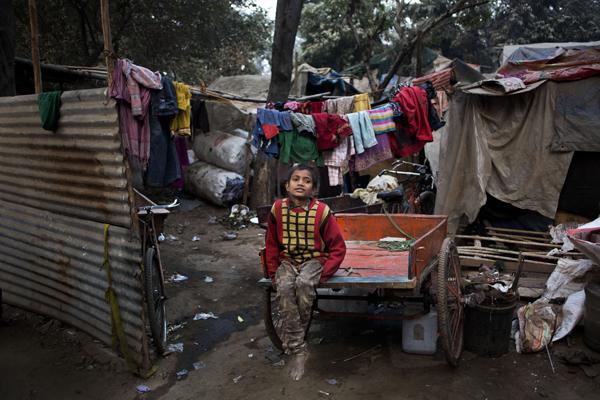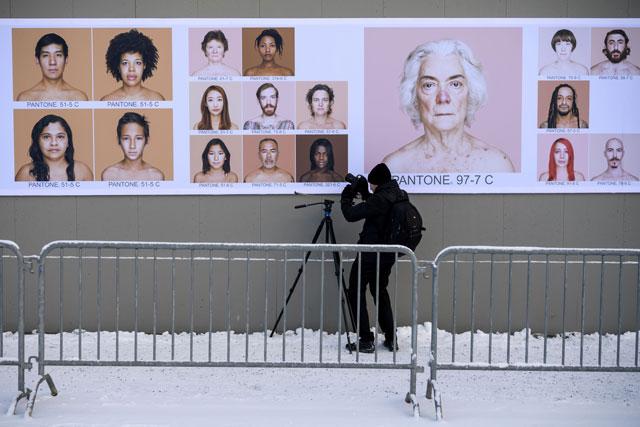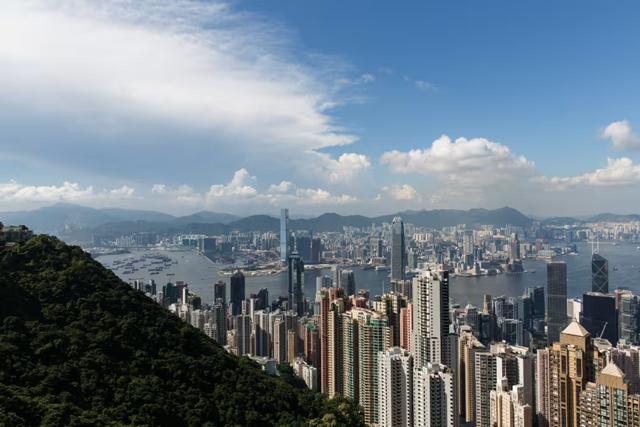You are here
Richest 62 people own same as half world's population — Oxfam
By Agencies - Jan 19,2016 - Last updated at Jan 19,2016

An Indian boy sits on a cart in a slum area, New Delhi, India, Monday (AP photo)
LONDON – The wealthiest 62 people now own as much as half the world's population, some 3.5 billion people, as the super-rich have grown richer and the poor poorer, an international charity said on Monday.
The wealth of the richest 62 people has risen by 44 per cent since 2010, while the wealth of the poorest 3.5 billion fell 41 per cent, Oxfam indicated in a report released ahead of the World Economic Forum's (WEF) annual meeting in Davos, Switzerland.
Almost half the super-rich individuals are from the United States, 17 from Europe, and the rest from countries including China, Brazil, Mexico, Japan and Saudi Arabia.
"World leaders' concern about the escalating inequality crisis has so far not translated into concrete action — the world has become a much more unequal place and the trend is accelerating," Oxfam International's Executive Director Winnie Byanima, said in a statement accompanying the report.
"We cannot continue to allow hundreds of millions of people to go hungry while resources that could be used to help them are sucked up by those at the top," Byanima added.
About $7.6 trillion of individuals' wealth sits in offshore tax havens, and if tax were paid on the income that this wealth generates, an extra $190 billion would be available to governments every year, Gabriel Zucman, assistant professor at University of California, Berkeley, has estimated.
As much as 30 per cent of all African financial wealth is held offshore, costing about $14 billion in lost tax revenues every year, Oxfam indicated, referring to Zucman's work.
This is enough money to pay for healthcare that could save 4 million children's lives a year, and employ enough teachers to get every African child into school, Oxfam said in its report.
"Multinational companies and wealthy elites are playing by different rules to everyone else, refusing to pay the taxes that society needs to function. The fact that 188 of 201 leading companies have a presence in at least one tax haven shows it is time to act," Byanima said.
Ensuring governments collect the taxes they are owed by companies and rich individuals will be vital if world leaders are to meet their goal to eliminate extreme poverty by 2030, one of 17 Sustainable Development Goals set in September, Oxfam added.
Extreme poverty falling
The number of people living in extreme poverty has fallen by 650 million since 1981, even though the global population grew by 2 billion in that time, according to the Organisation for Economic Cooperation and Development (OECD).
Much of this change has been because of the rise of China, which alone accounted for half a billion people moving out of extreme poverty.
Most of the world's poorest no longer live in the poorest countries, but in middle-income countries like India, the OECD said in a recent report.
The inequalities are partly to do with differences in income, especially between urban and rural areas, but also differences in access to healthcare, education and jobs, the OECD added.
"The figures suggest that the biggest causes of poverty are ... political, economic and social marginalisation of particular groups in countries that are otherwise doing quite well," development economist Owen Barder is quoted as saying in the OECD report.
Barder is director for Europe at the Centre for Global Development.
Although taxes and transfers help reduce income inequality in developed countries, these systems are less robust in many developing countries, according to the OECD.
An exception is Brazil, which makes payments to more than 13.3 million poor families on condition they enrol children in school and take part in health programmes.
"That has helped to reduce rates of both child poverty as well as inequality," the OECD report concluded.
Separately, a report prepared for the Davos forum of business and political elites said that the latest industrial revolution will not only bring us 3-D printing and biotechnology advances, but the loss of 5 million jobs in the next five years.
The so-called fourth industrial revolution "will cause widespread disruption not only to business models but also to labour markets over the next five years", the WEF said announcing a study released ahead of the Davos forum this week.
Following the first industrial revolution of steam engines, then electricity and assembly lines, followed by electronics and robotics, the fourth industrial revolution will include a number of developments like big data and smart systems to transform the economy.
But that transformation will lead "... to a net loss of over 5 million jobs in 15 major developed and emerging economies," said the WEF, after analysing the potential impact on the economies of the United States, Germany, France, China, Brazil and other countries.
It sees as many as 7.1 million jobs being lost, mostly in white-collar office and administrative roles, with the creation of 2.1 million new jobs in fields such as computer engineering and mathematics.
"Without urgent and targeted action today to manage the near-term transition and build a workforce with futureproof skills, governments will have to cope with ever-growing unemployment and inequality, and businesses with a shrinking consumer base," the WEF's Executive Chairman Klaus Schwab warned in a statement.
A separate study found women will be "in the firing line" of the changes, which "may have a disproportionately negative impact on women".
While the job losses will be relatively equal, with 52 per cent of the expected 5.1 million job losses hitting men, in fact men still dominate the labour markets, so at 48 per cent the job losses among women will be relatively higher than their participation in the job market.
Moreover, women are underrepresented in the technical fields where new jobs are to be created.
Related Articles
LONDON — Eight men own the same wealth as the poorest half of the world's population, a level of inequality which "threatens to pull our soc
RIO DE JANEIRO — Anti-poverty campaigners have hailed a decision by G20 leaders meeting in Rio to make sure the world's billionaires "are ef
HONG KONG — Hong Kong's richest households now earn 80 times as much as the poorest, a figure that more than doubled in five years as the ci



















